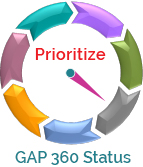
There is a strong interest from members of the community for more research to better pinpoint cancer risk with different mutations. Even for people with BRCA1 and BRCA2 mutations, which have been studied for over 20 years, risk assessment is not as accurate as people wish. This is even more apparent with newly identified mutations such as PALB2 and CHEK2 among others.

Blood relatives of people with BRCA mutations meet national guidelines for testing. Health care providers are limited in their ability to reach out to relatives of patients due to HIPPAA, putting increased pressure on patients who test positive to contact their relatives. Cascade testing – where one member who tests positive for a mutation notifies relatives – is considered an effective way to improve uptake. Currently about 30% of people who meet national guidelines undergo testing for BRCA. This proposal would use our PaGeMe rubric to develop patient generated messaging to help people speak to relatives about genetic testing and navigate them through the testing process.

In 2006 the Institute of Medicine issued a report recommending that all cancer patients receive an individualized survivorship care plan at the completion of treatment with recommendations for monitoring and maintaining their health and wellbeing. These plans vary across health care facilities. Some of the survivorship plans include information about genetic counseling and testing. The question proposed would compare whether patients who receive information about recommendations about genetic services in their survivorship plan have higher rates of genetic testing that those who do not receive this information.

Genetics is a rapidly advancing area of science and medicine. Genetic testing has become more complicated with the discovery of new genes that affect cancer risk. Guidelines recommend that people speak with trained experts known as genetic counselors before undergoing genetic testing. As the cost of genetic testing has decreased, more people are turning to health care providers without expertise in genetics for information about genetic testing and medical options for managing risk. There is a lack of research on the quality of the information and the amount of misinformation that health care providers are sharing with patients with regards to cancer genetic testing, and the best ways to assure that health care providers are following recommended national guidelines.

Despite increasing uptake of genetic testing due to more awareness, more access to testing and lowered cost of testing, only a small percentage of men who meet guidelines actually undergo genetic testing. This research would look at whether messaging developed and delivered by patients improves uptake of genetic counseling and testing by men who meet national guidelines.
ABOUT's patient-driven research process, known as "GAP360" takes unanswered medical questions submitted by the community and turns them into well-defined research questions that can be answered through ABOUT research. GAP stands for Generate, Assess, Prioritize, Plan, Perform, and Publish — the steps that are involved in this process.
Submit your research questions

ABOUT is a Patient-Powered Research Network in PCORnet®, the National Patient-Centered Clinical Research Network, an initiative funded by the Patient-Centered Outcomes Research Institute (PCORI).


© FORCE: Facing Our Risk of Cancer Empowered Inc. info@facingourrisk.org
Website by Rareheron Web Design